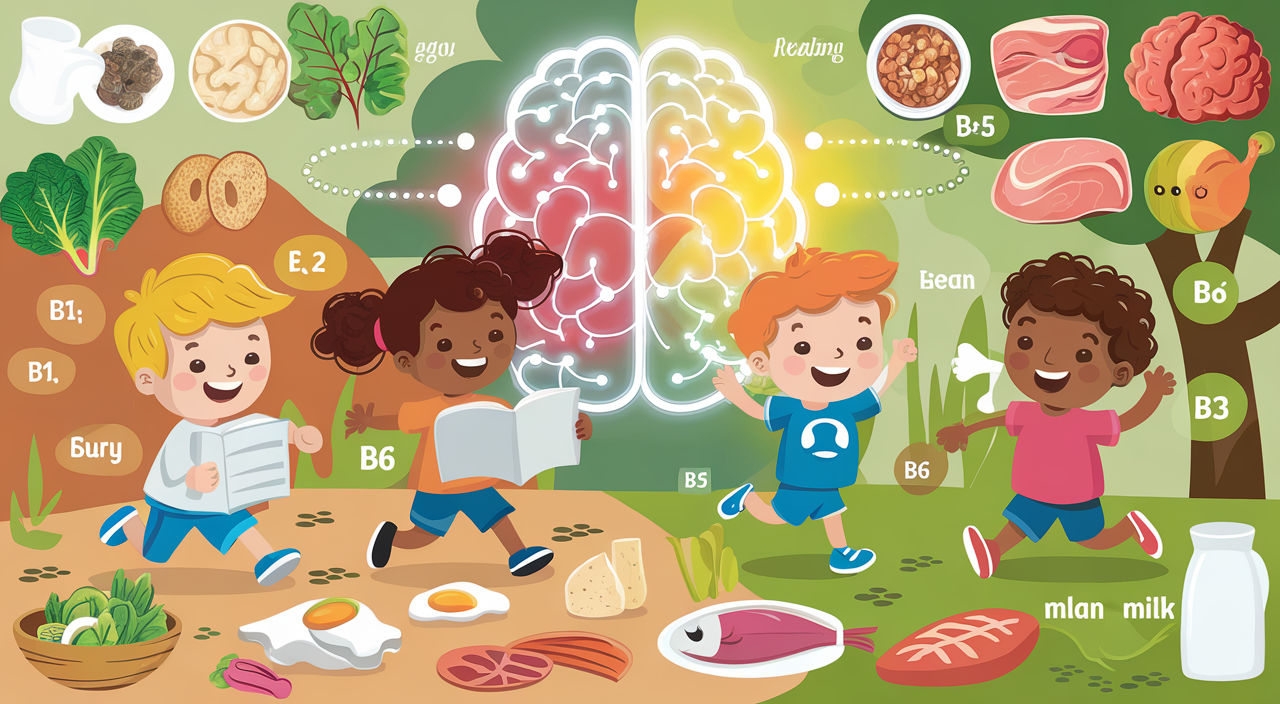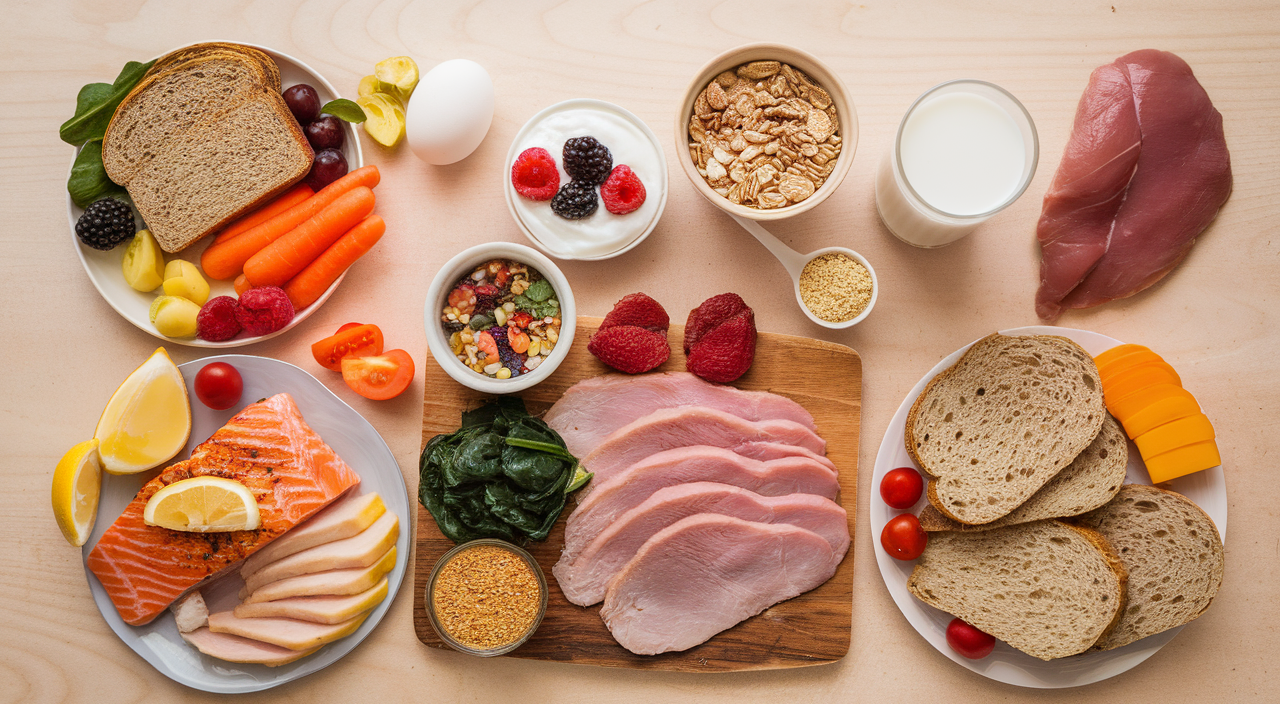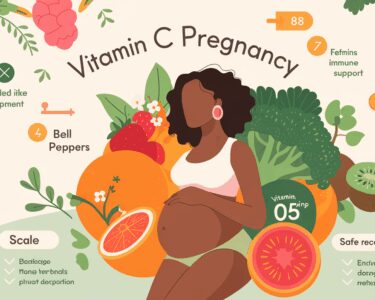Vitamin B For Kids Benefits: Vitamin B vitamins stand as critical elements for children’s brain function, energy creation, and growth, acting as key builders for nerve coating and vital components for DNA production and cellular growth. These nutrients boost memory and school success while turning food into energy, supporting kids from their first months through adolescence.
Key Takeaways
- B12 and other B vitamins support brain development through neural myelination, directly impacting how quickly and effectively children learn and process information.
- Children need specific daily amounts of B12 based on age, ranging from 0.4 mcg for infants to 2.4 mcg for teenagers.
- B vitamins are essential for energy production, helping break down carbohydrates, fats, and proteins while preventing fatigue during physical activities and school.
- Top food sources include animal products (lean meats, eggs, dairy) and plant-based options (fortified cereals, nutritional yeast, whole grains, leafy greens).
- Warning signs of deficiency include persistent tiredness, slowed growth, poor concentration, irritability, and pale skin – with vegan or vegetarian children being at higher risk.
Why Your Child Needs Vitamin B for Brain Power and Growth
Vitamin B for Kids Benefits: Building Blocks for Development
B12 and folate stand as essential nutrients that power your child’s growth and development. Just as I help my kids maintain balanced nutrition for better moods, these B vitamins play a crucial role in DNA synthesis and cell division – the fundamental processes that drive your child’s development.
Think of B vitamins as architects of your child’s brain. They’re responsible for neural myelination, a process that coats nerve cells with protective layers, similar to insulation around electrical wires. This coating helps messages travel faster through the brain, directly impacting how quickly and effectively your child learns and remembers information.
Boosting Brain Power and Academic Success
I’ve found that many parents don’t realize the strong connection between B vitamins and academic performance. Just like creating an organized meal plan helps with daily nutrition, maintaining proper B12 levels helps maintain optimal brain function. Here’s what these powerhouse vitamins do for your child’s cognitive development:
- Enhance memory retention and learning capacity
- Support better concentration during school hours
- Aid in processing new information more effectively
- Help maintain steady energy levels throughout the day
Starting from pregnancy and continuing through childhood, Vitamin B for Kids Benefits extend far beyond basic growth. These nutrients are particularly vital during key developmental stages when the brain is forming new connections. Think of B vitamins as brain fuel – they help power those countless neurons firing as your child masters new skills, from reading their first word to solving complex math problems.
The effects of proper B vitamin intake can be seen in improved school performance and higher IQ scores. I recommend incorporating B-vitamin rich foods into your child’s daily snack routine to support their cognitive development. Making simple switches like choosing whole grains over refined ones can make a significant difference in their B vitamin intake.
Remember that consistent intake is key – just as you’d maintain a regular snacking schedule, ensuring steady B vitamin levels helps support ongoing brain development and academic success.
Power Up Your Kid’s Energy with B Vitamins
Essential Vitamin B for Kids Benefits in Energy Production
B vitamins play a crucial role in transforming the food your child eats into usable energy. I’ve seen how these powerful nutrients can make a real difference in keeping kids active and energized throughout their busy days. Just like creating balanced meal prep options, ensuring proper B vitamin intake is key to supporting your child’s growth and development.
The B-vitamin family works together to break down carbohydrates, fats, and proteins – the main fuel sources your child needs. B1 (thiamine) kicks off the energy production process, while B2 (riboflavin) keeps the energy flowing smoothly. B3 (niacin) steps in to help process fats and sugars, and B5 (pantothenic acid) supports the creation of red blood cells that carry oxygen throughout the body.
Supporting Active Kids with Vitamin B Benefits
Your child’s growing body needs steady energy support, especially during physical activities and school hours. Here’s how these B vitamins specifically help maintain their energy levels:
- B1 helps prevent tiredness and supports muscle function
- B2 maintains healthy blood cells and boosts energy production
- B3 aids in converting food to usable energy
- B5 helps produce energy from foods
These vitamins don’t just support energy – they’re essential for overall health too. I recommend incorporating B-vitamin rich foods into your child’s healthy snack plates and meals. They support proper digestion and help maintain a healthy nervous system, which is crucial for growing kids.
The Vitamin B for Kids Benefits extend beyond just energy production. They’re vital for brain development and can help improve focus during school hours. When combined with strategic meal planning, B vitamins can help stabilize your child’s energy levels throughout the day.
To maximize Vitamin B for Kids Benefits, I suggest including plenty of whole grains, lean meats, eggs, and leafy greens in their diet. These foods naturally contain high levels of B vitamins and can be easily incorporated into kid-friendly snack routines. Regular intake of these nutrients helps prevent energy crashes and supports consistent vitality throughout the day.
Critical B12 Amounts Your Child Needs Daily
Essential B12 Requirements for Vitamin B for Kids Benefits
Getting the right amount of B12 is crucial for your child’s development. I’ve found that many parents aren’t sure about the exact amounts their kids need at different ages. Here’s a clear breakdown of the daily B12 requirements that support proper growth and development while maximizing Vitamin B for Kids Benefits:
- Infants (0–6 months): 0.4 mcg
- Infants (7–12 months): 0.5 mcg
- Toddlers (1–3 years): 0.9 mcg
- Children (4–8 years): 1.2 mcg
- Children (9–13 years): 1.8 mcg
- Teens (14–18 years): 2.4 mcg
Signs of B12 Deficiency to Watch For
Understanding Vitamin B for Kids Benefits starts with recognizing potential deficiency signs. If your child isn’t getting enough B12, they might experience weakness, unusual fatigue, or struggle with cognitive tasks. I’ve noticed that incorporating balanced meal planning strategies can help ensure proper B12 intake.
Making B12-rich foods appealing to kids doesn’t have to be challenging. I recommend creating visually appealing meal preparations that include B12 sources like eggs, dairy, and fortified cereals. For picky eaters, try incorporating B12-rich ingredients into attractive snack plates that make healthy eating fun and engaging.
For vegetarian or vegan children, paying extra attention to B12 intake is essential. Consider creating creative snack routines with fortified plant-based milk, nutritional yeast, and other B12-fortified foods to maintain optimal levels and ensure your child receives all the Vitamin B for Kids Benefits they need for healthy growth and development.
Best Food Sources to Boost Your Child’s B Vitamin Intake
Animal-Based Vitamin B for Kids Benefits
I’ve found that incorporating the right mix of B-vitamin rich foods can supercharge your child’s health. Animal products pack a powerful punch when it comes to Vitamin B for kids benefits. Dairy products like yogurt and milk deliver essential B vitamins while supporting bone health. Eggs are another fantastic source, offering a complete B-vitamin profile that’s perfect for creating balanced breakfast meals.
Lean meats, poultry, and fish don’t just provide protein – they’re loaded with different B vitamins that support your child’s growth and development. Here are some top animal-based sources to consider:
- Salmon and tuna for B12 and B6
- Turkey and chicken for niacin (B3)
- Beef liver for folate (B9)
- Greek yogurt for riboflavin (B2)
Plant-Based Sources and Supplementation
For families following plant-based diets, getting adequate B vitamins requires extra attention. I recommend focusing on fortified foods and specific plant sources to ensure your child gets enough of these crucial nutrients. Creating appealing snack plates with B-vitamin rich foods can make healthy eating fun for kids.
Nutritional yeast is a game-changer for boosting B vitamin intake – it’s got a cheese-like flavor that kids often enjoy. Planning vitamin-rich meals becomes easier when you include these plant-based sources:
- Fortified breakfast cereals
- Plant-based milk alternatives
- Whole grains and legumes
- Dark leafy greens
For vegan or vegetarian children, supplementation might be necessary, especially for B12. The recommended approach for toddlers is four drops of liquid B12, with each drop containing 2.5 mcg. This ensures they meet their daily requirements while maintaining their dietary preferences. Creating regular snack routines that incorporate these B-vitamin rich foods can help establish healthy eating habits.
Remember that Vitamin B for kids benefits are maximized when these nutrients come from a variety of sources throughout the day. By mixing both fortified and natural food sources, you’ll create a balanced approach to meeting your child’s B vitamin needs.
Warning Signs of B Vitamin Deficiency in Kids
Common Vitamin B for Kids Benefits and Deficiency Red Flags
Identifying B vitamin deficiency early can protect your child’s health and development. I’ve found that parents often miss subtle signs that their kids aren’t getting enough B vitamins, especially in those following plant-based meal plans.
The most frequent warning signs include:
- Persistent tiredness and weakness
- Slowed growth patterns
- Poor appetite
- Difficulty concentrating
- Irritability and mood changes
- Pale or yellowish skin
- Mouth sores or cracks around lips
High-Risk Groups and Prevention Strategies for Vitamin B for Kids Benefits
Children following vegan or vegetarian diets need extra attention to their B vitamin intake. I recommend parents of plant-based kids focus on strategic meal planning to ensure adequate nutrition. Without proper supplementation, these children face increased risks of deficiency.
Long-term B vitamin deficiency can cause serious health issues:
- Developmental delays
- Neural tube defects
- Cognitive problems
- Nerve damage
- Anemia
- Compromised immune function
If you spot any warning signs, don’t wait to act. Quick intervention through diet changes or supplements can reverse symptoms before they become severe. I always suggest incorporating B-vitamin-rich foods through balanced snack plates while waiting for professional guidance.
For optimal absorption of B vitamins, pair them with healthy fats found in foods like avocados or nuts. Creating regular snack routines with these combinations helps maintain steady B vitamin levels throughout the day.
Remember, each child’s needs differ based on age, diet, and activity level. A pediatrician can check B vitamin levels through simple blood tests and create a personalized plan to address any deficiencies. They’ll also monitor your child’s progress and adjust supplementation as needed.
Regular check-ups combined with a balanced diet rich in B vitamins help ensure your child reaps all the essential Vitamin B for Kids Benefits necessary for healthy growth and development.
Ensuring your child gets enough energy-boosting nutrients, like those found in essential B vitamins, can support healthy brain development and metabolism.
Sources:
“Vitamin B12 supplementation for growth, development, and cognition in children” – PMC
“Vitamin B-12 and Cognition in Children” – PubMed Central
“Why Is the Vitamin B Complex Important for Kids?” – Hiya Health
“Vitamin B-12, Folic Acid, and Growth in 6- to 30-Month-Old Children” – Pediatrics
“B12 Deficiency in Children: What to Know” – WebMD
“Vitamin B12 for Kids: Meeting Needs with Supplements” – Plant-Based Juniors
“Vitamin B | Better Health Channel”
“Vitamin B12: how much should kids take?” – Uscriptives








